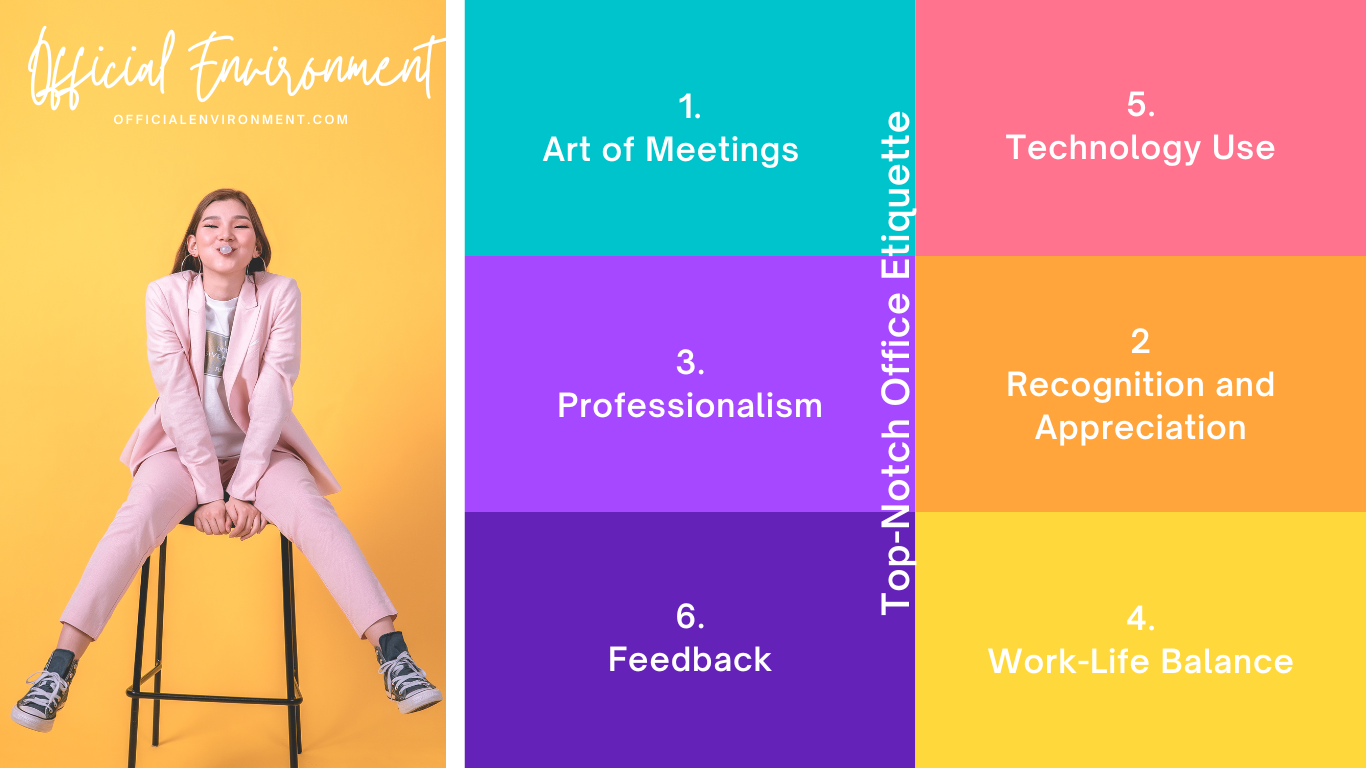In today's dynamic work environment, a manager's role goes far beyond simply assigning tasks and meeting deadlines. You're a leader, a mentor, and a cultural architect, shaping the everyday experience of your team. That's where mastering office etiquette becomes crucial. It's not just about good manners; it's about fostering a respectful, productive, and thriving work environment where everyone feels valued and empowered to do their best work.
Let's face it, studies show that happy employees are more productive employees. A Society for Human Resource Management survey revealed that 80% of workers report feeling less stressed when they work in a positive work environment. Meanwhile, a Gallup study found that highly engaged teams show 21% greater profitability. So, how do you, as a manager, cultivate this positive environment? Here are 21 do's and don'ts to elevate your office etiquette game and become a leader your team thrives under:
🤝 Mastering the Art of Meetings: Efficiency and Respect
· Do: Set clear agendas and action items for meetings. Ensure everyone knows the purpose of the meeting and what outcomes you expect. This keeps everyone focused and avoids wasting valuable time.
· Don't: Dominate conversations or schedule pointless meetings. Let everyone participate and contribute their ideas. Remember, good ideas can come from anyone, regardless of seniority.
· Do: Respect everyone's time. Start and end meetings on time. If someone can't attend a meeting that directly impacts them, consider alternative solutions like recording the session or providing a detailed summary.
· Don't: Disregard team input or run over allotted times. Be mindful of your team's schedules and stick to the agreed-upon timeframe. If the discussion goes off track, gently refocus on the agenda.
🎨 Recognition and Appreciation: The Power of Positive Reinforcement
· Do: Recognize achievements publicly and privately. A simple "thank you" or a team shout-out can go a long way in boosting morale and showing your appreciation for their hard work.
· Don't: Take credit for employee work. It's demoralizing and diminishes your team's sense of accomplishment. Highlight their contributions and celebrate their wins.
· Do: Offer genuine praise. Be specific about what you appreciate. Acknowledge a job well done, a creative solution, or a willingness to go the extra mile.
· Don't: Offer empty praise or play favorites. Insincere compliments lose their impact. Recognize genuine effort and achievements consistently across your team.
· Do: Delegate tasks that showcase skills. This shows trust in your team's abilities and provides opportunities for them to learn and grow.
👔 Professionalism: Setting the Standard for Your Team
· Do: Dress appropriately for your workplace culture. Whether it's business casual or formal attire, project a professional image that aligns with your company's environment.
· Don't: Engage in gossip or negativity. A leader sets the tone. Uphold a professional and respectful atmosphere where everyone feels comfortable focusing on their work.
· Do: Maintain a professional demeanor. Manage your emotions and avoid outbursts of anger, frustration, or bias.
· Don't: Blur personal and professional lines. Oversharing personal details or engaging in inappropriate behavior can create a sense of unease and undermine your authority.
· Do: Demonstrate a strong work ethic. Arrive on time, be present during work hours, and lead by example with your achievements.
🧤 Work-Life Balance: Fueling Well-Being and Productivity
· Do: Respect employee boundaries. Encourage breaks throughout the workday and be flexible with scheduling when possible. A well-rested and balanced team is a more productive team.
· Don't: Expect constant availability. Avoid sending after-hours emails for non-urgent matters. Respect your team's personal time and create a culture that prioritizes well-being alongside work demands.
· Do: Lead by example by taking breaks and disconnecting after work hours. This demonstrates your commitment to a healthy work-life balance and encourages your team to do the same.
· Don't: Create a culture of burnout. Overloading employees with work and unrealistic expectations leads to exhaustion and decreased morale. Encourage open communication about workload and be willing to adjust when necessary.
· Do: Encourage employees to use vacation time and personal days. Taking time off allows for rejuvenation and a return to work with renewed focus and energy.
🎭 Delegation: Empowering Your Team for Success
· Do: Delegate tasks clearly. Outline expectations, provide necessary resources, and ensure your team understands their responsibilities.
· Don't: Delegate without clear expectations. Ambiguous instructions lead to confusion and frustration. Invest time in proper delegation to ensure successful outcomes.
· Do: Empower employees to make decisions. Micromanaging stifles creativity and initiative. Trust your team to own their tasks and make informed choices within established parameters.
· Don't: Overload employees or take back control after delegating. Distribute tasks fairly and avoid the temptation to swoop in and take over. This undermines your team's confidence and hinders their development.
· Do: Offer opportunities for growth and development. Assign tasks that stretch your team's skills and provide access to training and resources to help them excel.

🧩 Feedback: Fostering Growth Through Open Communication
· Do: Provide timely, specific, and constructive feedback. Focus on both strengths and areas for improvement, and offer suggestions for development.
· Don't: Provide vague or unhelpful feedback. "Good job" doesn't tell someone how they can improve. Be specific about what they did well and offer actionable steps for growth.
· Do: Delay feedback. Addressing performance issues promptly allows for course correction and avoids fostering resentment.
· Don't: Offer feedback in public in a negative way. Public criticism is demoralizing and unproductive. Deliver constructive feedback privately in a respectful and supportive manner.
· Do: Encourage open communication about performance. Create a safe space for your team to ask questions and discuss their development goals.
💣 Conflict Resolution: Addressing Challenges with Respect
· Do: Address conflicts promptly and fairly. Don't let issues fester or sweep them under the rug.
· Don't: Avoid conflict resolution. Unaddressed conflict creates tension and disrupts team dynamics.
· Do: Encourage open communication between parties. Facilitate a conversation where both sides can express their concerns and work towards a solution.
· Don't: Take sides or make accusations. Remain impartial and focus on guiding the discussion towards a mutually beneficial resolution.
· Do: Mediate conflicts respectfully. Help your team members find common ground and avoid personal attacks.
🙌 Diversity and Inclusion: Building a Thriving Team Environment
· Do: Promote a culture of respect and inclusion. Value diverse perspectives, backgrounds, and experiences.
· Don't: Make discriminatory jokes or comments. Creating a safe and inclusive space requires sensitivity and awareness.
· Do: Provide equal opportunities for all employees. Ensure everyone has a fair shot at advancement and recognition.
· Don't: Tolerate harassment or bullying. Swiftly address any instances of discrimination or inappropriate behavior.
· Do: Celebrate differences in your team. A diverse team brings a wealth of ideas and perspectives to the table. Leverage this diversity to create a more innovative and successful workplace.
🔗 Technology Use: Striking a Balance
· Do: Set clear expectations for professional use of technology. Outline acceptable personal use during breaks and establish boundaries to minimize distractions.
· Don't: Distract yourself or others with personal use of technology during work hours. Lead by example and ensure your focus remains on work tasks.
· Do: Encourage breaks from screens. Constant screen time can lead to eye strain and decreased productivity. Promote healthy habits like taking walking breaks or scheduling short meetings away from computers.
· Don't: Expect employees to be constantly available. With the rise of remote work and smartphones, boundaries can blur. Respect designated work hours and avoid sending urgent emails outside of those times unless absolutely necessary.
· Do: Be mindful of digital privacy. Don't expect employees to share personal information or participate in unnecessary online discussions that could reflect poorly on the company.
👔 Dress Code: Reflecting Professionalism
· Do: Adhere to the company dress code. If there's no formal policy, err on the side of professionalism by dressing appropriately for your industry and client interactions.
· Don't: Dress inappropriately for the work environment. Ripped jeans and tank tops might be acceptable at a casual Friday gathering, but not for a client meeting.
· Do: Be mindful of cultural norms. If your company operates internationally, consider how your attire might be perceived in different cultural contexts.
· Don't: Make judgments about employees based on their clothing. Focus on their work performance and contributions, not their fashion choices.
· Do: Communicate dress code expectations clearly. If there's a company dress code, ensure everyone understands it. If it's more flexible, provide general guidelines to help employees make informed decisions.
Developing a healthy, comprehensive, and productive work environment where your team can develop their work. And, probably it is primary goal of mastering office etiquette as a supervisor or manager. As a higher position employee, you may inspire your team to engage the work to increase productivity.
By inspiring team and establishing trust each other ensure a meaningful communication, relevant acknowledgement and fixed boundaries. To establish a mellifluous workplace, it is required to micromanagement, friendly and clear expectation.
One thing is significant for you that your manner and etiquette are sets of the tone for your team.
Keep in mind that effective leadership is about setting a positive tone through professionalism, diversity, work-life balance, and focus on team development that help to make engagement, satisfaction, and a cooperative workplace.





